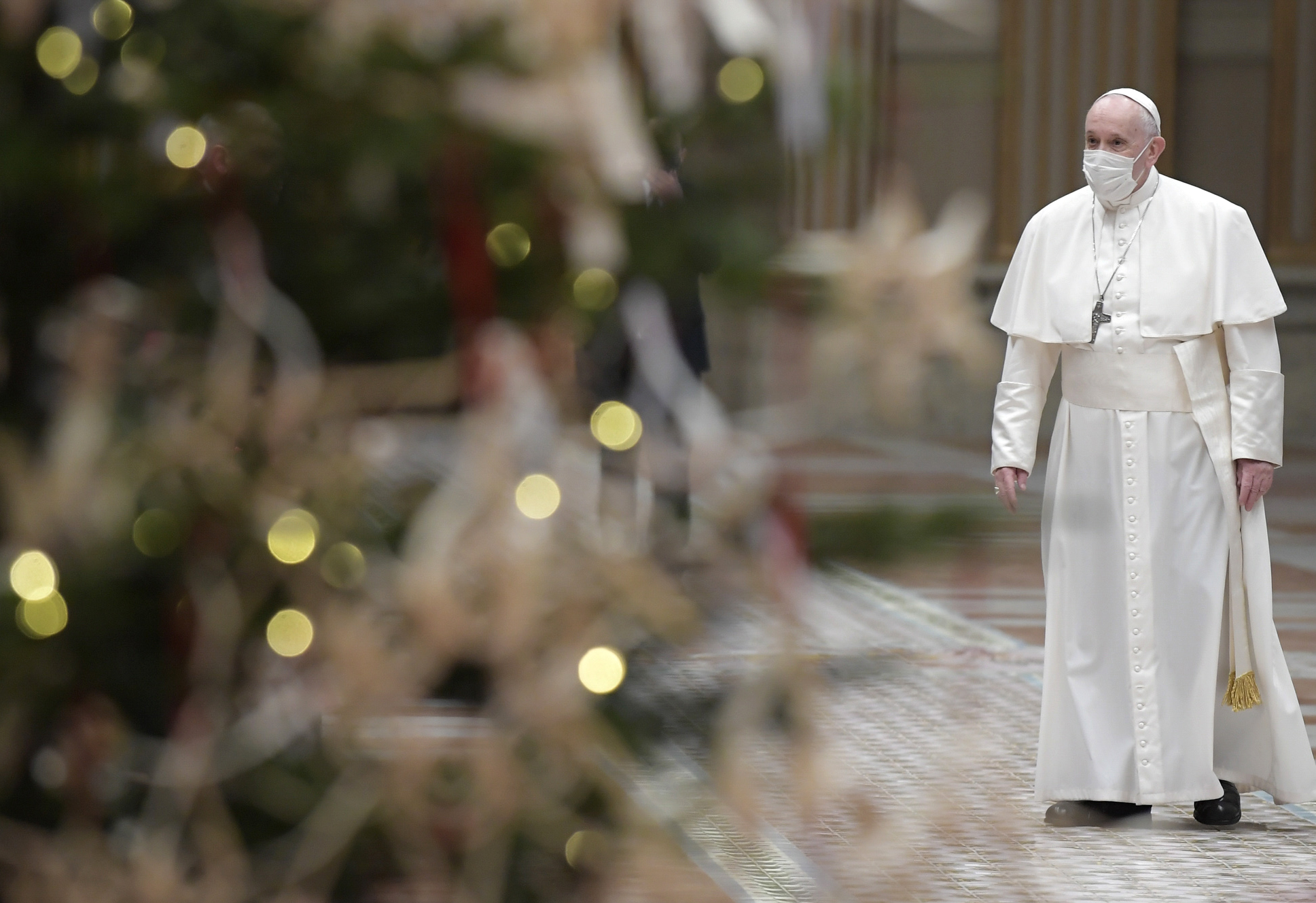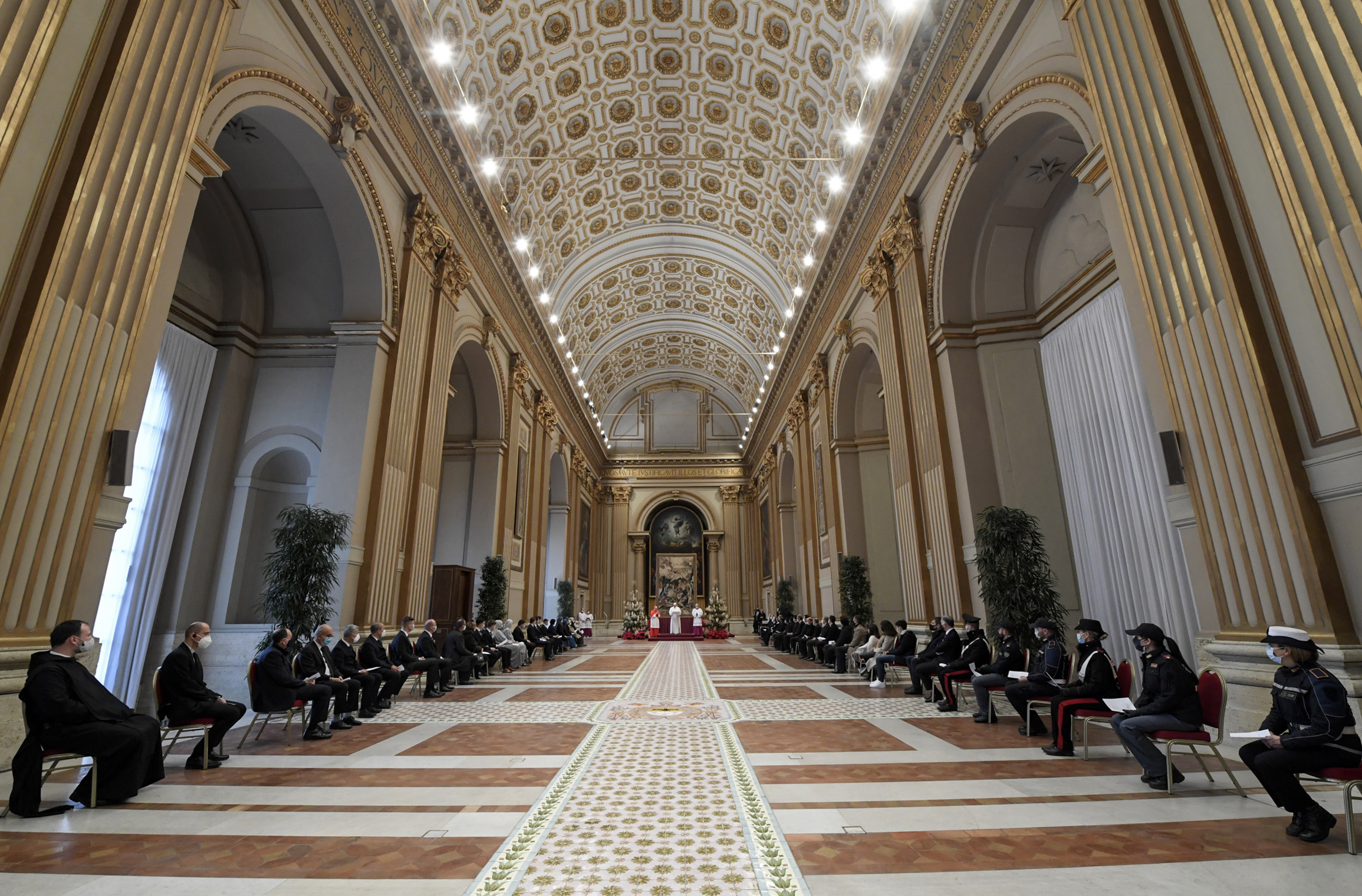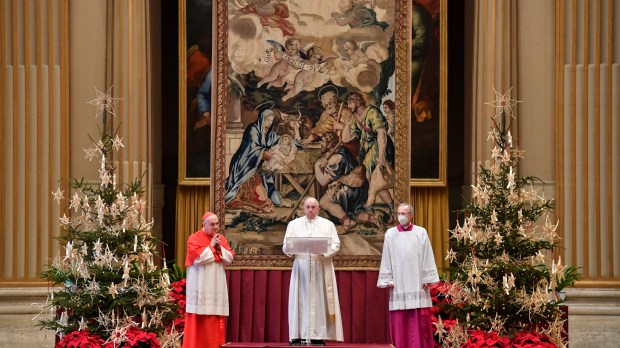
With the pandemic restrictions, Pope Francis gave the traditional Christmas “urbi et orbi” blessing (to the City of Rome and the world) from just behind the central balcony where he usually stands to give the message and bless the pilgrims in St. Peter’s Square.
Live-streamed from the Hall of Benediction of St. Peter’s Basilica, the Holy Father echoed the message of his encyclical of this year: that we are all brothers and sisters.
[T]his Child, Jesus, was born “to us”: an “us” without any borders, privileges or exclusions. The Child born of the Virgin Mary in Bethlehem was born for everyone: he is the “son” that God has given to the entire human family. Thanks to this Child, all of us can speak to God and call him “Father”. […] Thanks to this Child, we can all call one another brothers and sisters, for so we truly are. We come from every continent, from every language and culture, with our own identities and differences, yet we are all brothers and sisters.
The pope said that this moment of history, with all of its problems, and all of them made worse by the pandemic, “it is all the more important for us to acknowledge one another as brothers and sisters.”
God has made this fraternal unity possible, by giving us his Son Jesus. The fraternity he offers us has nothing to do with fine words, abstract ideals or vague sentiments. It is a fraternity grounded in genuine love, making it possible for me to encounter others different from myself, feeling com-passion for their sufferings, drawing near to them and caring for them even though they do not belong to my family, my ethnic group or my religion. For all their differences, they are still my brothers and sisters. The same thing is true of relationships between peoples and nations: brothers and sisters all!
Francis said that as we celebrate this light, we see various lights of hope, such as the vaccines. “But,” he said, “for these lights to illuminate and bring hope to all, they need to be available to all.”
He warned against the “virus of radical individualism” that can make us “indifferent to the suffering of other brothers and sisters.”
I cannot place myself ahead of others, letting the law of the marketplace and patents take precedence over the law of love and the health of humanity. I ask everyone – government leaders, businesses, international organizations – to foster cooperation and not competition, and to seek a solution for everyone: vaccines for all, especially for the most vulnerable and needy of all regions of the planet. Before all others: the most vulnerable and needy!
“May the Child of Bethlehem help us, then, to be generous, supportive and helpful,” he prayed.
In the face of a challenge that knows no borders, we cannot erect walls. All of us are in the same boat. Every other person is my brother or my sister. In everyone, I see reflected the face of God, and in those who suffer, I see the Lord pleading for my help. I see him in the sick, the poor, the unemployed, the marginalized, the migrant and the refugee: brothers and sisters all!

Specific regions in need
Pope Francis went on to mention specific regions of the planet with particular needs, especially the need for peace.
He mentioned and prayed for:
– On this day, when the word of God became a child, let us turn our gaze to the many, all too many, children worldwide, especially in Syria, Iraq and Yemen, who still pay the high price of war.
– The Middle East and the Eastern Mediterranean
– May the Infant Jesus heal the wounds of the beloved Syrian people
– May he bring comfort to the Iraqi people and to all those involved in the work of reconciliation, and particularly to the Yazidis
– May he bring peace to Libya
– May the Babe of Bethlehem grant the gift of fraternity to the land that witnessed his birth. May Israelis and Palestinians regain mutual trust and seek a just and lasting peace
– May the star that shone brightly on Christmas night offer guidance and encouragement to the Lebanese people
– May the Son of the Most High sustain the commitment of the international community and the countries involved to continue the ceasefire in Nagorno-Karabakh, as well as in the eastern regions of Ukraine
– May the Divine Child alleviate the suffering of the peoples of Burkina Faso, Mali and Niger, affected by a grave humanitarian crisis caused by extremism and armed conflicts, but also by the pandemic and other natural disasters.
– May he end the violence in Ethiopia
– The Cabo Delgado region in northern Mozambique, victims of the violence of international terrorism
– South Sudan, Nigeria and Cameroon
– May the Eternal Word of the Father be a source of hope for the American continent, particularly affected by the coronavirus
– The recent social tensions in Chile and end the sufferings of the people of Venezuela.
– May the King of Heaven protect all victims of natural disasters in Southeast Asia, especially in the Philippines and Vietnam
– As I think of Asia, I cannot forget the Rohingya people
Joy and hope
“‘To us a child is born’ (Is 9:6). He came to save us! He tells us that pain and evil are not the final word. To become resigned to violence and injustice would be to reject the joy and hope of Christmas,” the pope said.
And his final thought was for families:
Jesus was born in a stable, but was embraced by the love of the Virgin Mary and Saint Joseph. By his birth in the flesh, the Son of God consecrated familial love. My thoughts at this moment turn to families: to those who cannot come together today and to those forced to remain at home. May Christmas be an opportunity for all of us to rediscover the family as a cradle of life and faith, a place of acceptance and love, dialogue, forgiveness, fraternal solidarity and shared joy, a source of peace for all humanity.

Read more:
A Charlie Brown Christmas, and the message we missed

